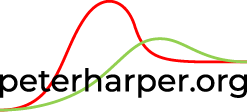Lifestyles
Most of this section is about the 'software' of life: how we behave, as opposed to the technical 'hardware'. The different emphasis on 'technical fixes' and 'lifestyle change' is one of the greatest fault-lines of the environmental movement, and I have been exploring it for several decades.
There are two categories here. One is about the theoretical basis of changing the ways we live, the other about trials and experiments I have carried out myself as a participant observer, which I call 'techno-anthropology' , as if I am a member of some strange modern tribe whose behaviour needs recording, measuring and interpreting.
Having been considering this topic for a long time, it appears that most of the measures required have long been known and to some extent explored by 'enthusiasts'. As a result much of the material here is quite old, because there's not a great deal to add.
Having said this, in recent years there has been much greater interest from the formal research community, and this is extremely welcome. It is sometimes exasperating however, to find academics ignoring decades of actual experience, and starting from scratch as if they just had the whole idea themselves. Oh well, better late than never.
But here’s a paradox. Just as the academic world is catching up with the idea of low-carbon lifestyles, the urgency of the climate situation has rendered them less significant as emergency decarbonisation tools. Now, sadly perhaps, we need rapid deployment of low-carbon infrastructure in energy, materials and land use. I made this argument in a joint paper with Stephen Peake of the Open University:
That is a rather heavy academic paper, albeit with cartoons. Here is the argument in a nutshell:
A basic argument against the pure lifestyle approach (2024)
But in case any readers imagine I am approaching the matter through ignorance, see
Am I a Naive Materialist? (2021)
The remaining items here are mostly explorations of ‘alternative’ lifestyles that also offer improvements in the quality of life. The ‘alternative movement’ pioneered these and was somewhat sneered at. Gradually, bien pensant opinion is coming round, if not the mainstreams in modern societies. Sadly, therefore, take-up of these practices is severely limited, and they are unlikely to contribute as much as was once hoped, to the decarbonisation of the UK economy. A comparison of lifestyle changes and top-down infrastructure measures can be found in the gamified carbon calculator here:
Techno-anthropology
Techno-anthropology in the Home 2000 (doc)
The Lifestyle Lab (doc)
The No. 24 Show (ppt)
Theory
Parallel Futures (doc)
Reducing Household Impacts (ppt)
Sustainable Lifestyles of the Future (doc)
Probing the limits of local production (Word, 2015)

